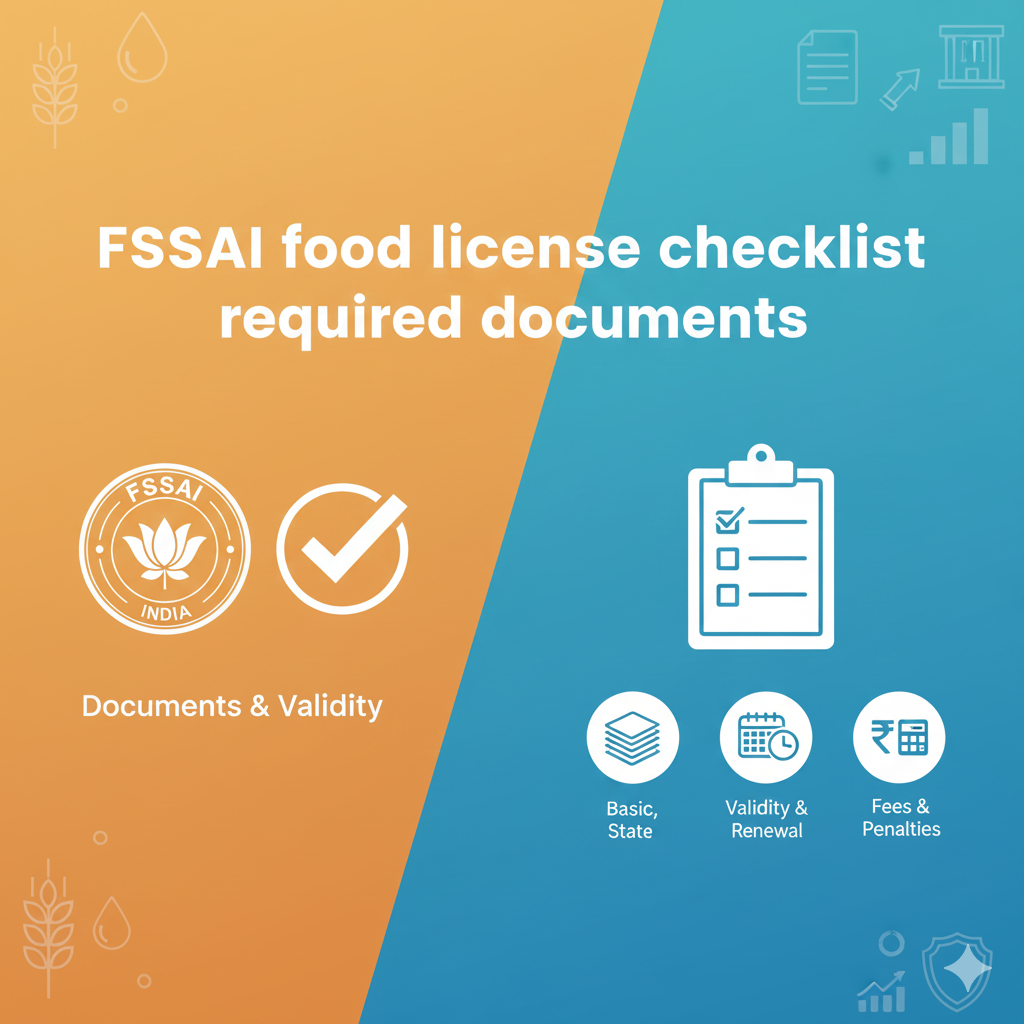I. Introduction: Why FSSAI Licensing is Non-Negotiable
In India, every food business, no matter how small—from a home baker to a major hotel chain—must obtain a license or registration from the Food Safety and Standards Authority of India (FSSAI) under the FSS Act, 2006.
This license is not just a legal requirement; it’s a mark of trust and credibility for your customers. Failure to obtain the correct license can lead to severe fines and even imprisonment.
This comprehensive checklist will guide you through determining the correct license type, gathering the necessary documents, understanding the latest fees, and knowing the critical timelines for a successful application on the FoSCoS portal.
II. Step 1: Determine Your FSSAI License Type & Fees
The type of license you need is based primarily on your annual turnover and your business scope (single vs. multiple states). This determines the required documents and the statutory fee.
| License Type | Annual Turnover Limit (Approx.) | Scope of Business | Statutory Fee (Per Year) |
| 1. Basic Registration | Up to ₹12 Lakh | Small vendors, roadside hawkers, petty retailers, home-based businesses. | ₹100 |
| 2. State License | ₹12 Lakh to ₹20 Crore | Medium restaurants, storage units, medium manufacturers (operating only within one state). | ₹2,000 to ₹5,000 (Varies by business type) |
| 3. Central License | Above ₹20 Crore / Importers / Operating in Multiple States | Large manufacturers, exporters, central offices of corporate chains. | ₹7,500 |
III. Step 2: The Universal FSSAI Required Documents Checklist
These documents are the baseline requirement for all applications (Basic, State, and Central) and must be submitted on the FoSCoS portal:
- Photo & Identity Proof:
- Passport-sized photograph(s) of the Proprietor/Partner/Director.
- Identity Proof of the FBO (Aadhaar Card, Voter ID, PAN Card, Driving License).
- Premise Proof:
- Proof of Address of the Business Premises (Electricity Bill/Water Bill/Property Papers).
- If Rented: Copy of the legally valid Rental Agreement or an NOC (No Objection Certificate) from the landlord.
- Application Form:
- Duly filled and signed Form B (the standard application form).
IV. Step 3: Additional Documents Checklist (State & Central Licenses
For larger businesses, the FSSAI requires additional documentation to ensure operational compliance:
A. For Manufacturing/Processing Units
- Blueprint/Layout Plan: Detailed plan showing the area of the processing unit, equipment layout, and functional areas (e.g., washing, packaging).
- List of Equipment/Machinery: Complete list with capacity and horsepower (e.g., mixers, boilers, chillers).
- Analysis Report of Water: Chemical and bacteriological analysis report of the water to be used in processing, issued by an NABL accredited laboratory.
- Food Safety Management System (FSMS) Plan: Detailed plan on how the business manages food safety (mandatory for State/Central).
- List of Raw Material Sources (Especially critical for Central Licenses).
B. For Companies, Partnerships, and Trusts
- Copy of MoA (Memorandum of Association) and AoA (Articles of Association) for companies, or Partnership Deed for firms.
- List of Directors/Partners/Executive Members with their full contact details.
- NOC from the Local Municipality (often required depending on the state).
C. For Importers/Exporters (Central License Only)
- Import Export Code (IEC) issued by the DGFT.
V. Step 4: Processing Time and Approval Timeline
The time taken depends heavily on the accuracy of your submitted documents. Errors or missing documents will lead to queries and significant delays.
| License Type | Ideal Processing Time | Potential Delays Due To |
| Basic Registration | 7 to 10 Days | Incorrect ID details or address mismatch. |
| State License | 15 to 30 Days | Incomplete FSMS plan or pending physical inspection. |
| Central License | 30 to 45 Days | Detailed verification of raw material sources or capacity audits. |
Crucial Rule: If the FSSAI raises a query, you have 30 days to submit a complete response via the FoSCoS portal. Failure to respond within this period often results in auto-rejection of the application.
VI. FSSAI License Validity and Renewal Process
- Validity: You can choose a license period ranging from 1 year up to a maximum of 5 years. Opting for 5 years saves administrative hassle and renewal fees in the short term.
- Renewal Mandate: The application for renewal must be filed within 30 days but no later than 1 day before the expiry date.
- Penalty for Late Renewal: A renewal application filed between 1 to 90 days after expiry may attract a penalty of ₹100 per day in addition to the standard renewal fee. After 90 days, the license is considered lapsed, and you must apply for a fresh license.
VII. 🛑 Penalties for Non-Compliance (Don’t Risk It!)
Operating without a valid FSSAI license is a grave offense under the FSS Act, 2006.
| Offense | Section of FSS Act | Penalty |
| Operating Without a License | Section 63 | Fine up to ₹5 Lakh and Imprisonment up to 6 months. |
| Selling Substandard Food | Section 51 | Fine up to ₹5 Lakh. |
| Misleading Advertisements | Section 53 | Fine up to ₹10 Lakh (for false claims or deceptive promotions). |
| Selling Unsafe Food (Causing injury/death) | Section 59 | Imprisonment from 6 months to life and a fine of ₹10 Lakh or more. |
VIII. Conclusion: Start with the Right Paperwork
Securing your FSSAI license is the fundamental step toward establishing your food business’s credibility and legal standing. By using this checklist and ensuring your documents are complete and accurate upon submission, you can drastically cut down on processing time and avoid costly penalties.





